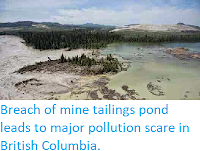A skier has died in an avalanche in the Whistler and Pemberton area of British Columbia on Wednesday 28 March 2018. Lisa Korthals, 49, a heli-skiing guide with over 25 years experience was caught in the avalanche near South Creek slightly before 3.00 pm local time. She was still alive when dug out of snow, but died later in hospital despite prompt first aid and prompt transportation to a local hospital.
Lisa Korthals, 49, killed in an avalanche in British Columbia on 28 March 2018. Facebook/Vancouver Courier.
Avalanches are caused by the mechanical failure of snowpacks;
essentially when the weight of the snow above a certain point exceeds
the carrying capacity of the snow at that point to support its weight.
This can happen for two reasons, because more snow falls upslope,
causing the weight to rise, or because snow begins to melt downslope,
causing the carrying capacity to fall. Avalanches may also be triggered
by other events, such as Earthquakes or rockfalls. Contrary to what is
often seen in films and on television, avalanches are not usually
triggered by loud noises. Because snow forms layers, with each layer
typically occurring due to a different snowfall, and having different
physical properties, multiple avalanches can occur at the same spot,
with the failure of a weaker layer losing to the loss of the snow above
it, but other layers below left in place - to potentially fail later.
Diagrammatic representation of an avalanche, showing how layering of snow contributes to these events. Expedition Earth.
Northwestern North America have seen a number of
avalanche related incidents this winter,
largely due to high levels of snowfall. This is, in turn caused by
warmer conditions over the Pacific, which leads to higher rates of
evaporation over the ocean, and therefore higher rates of precipitation
over North America, which falls as snow in cooler upland regions. There
are further concerns that as the climate warms in the coming months, the
thawing of this snow will lead to further dangerous avalanches.
See also...
Follow Sciency Thoughts on Facebook.








